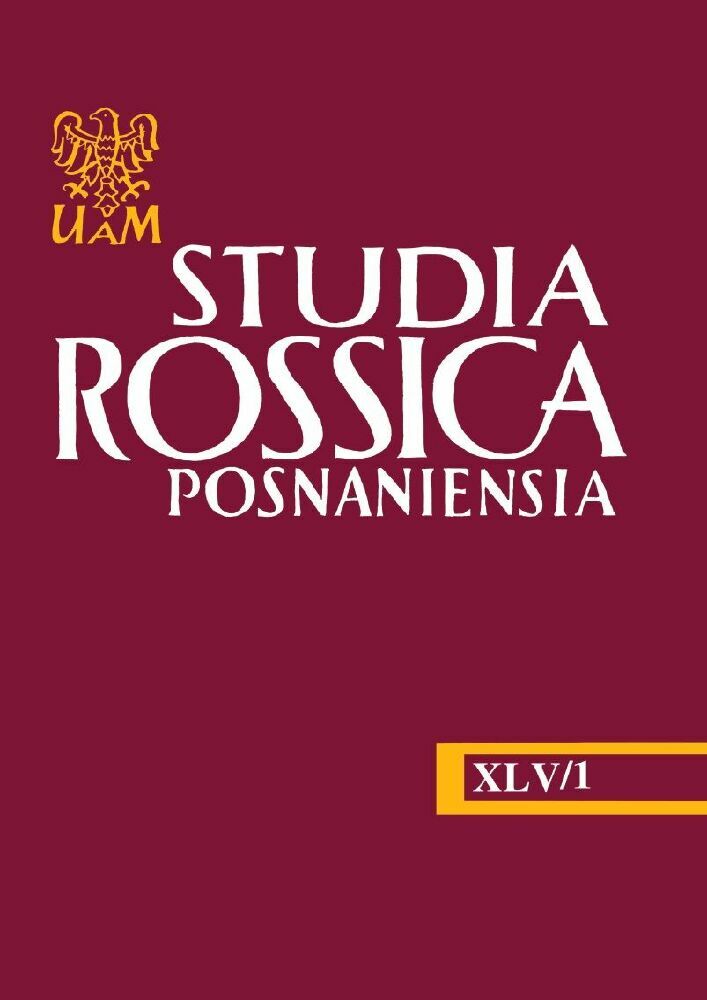Abstract
The article is an attempt to analyse the novels The Idiot by Fyodor Dostoyevsky and The Magic Mountain by Thomas Mann in the context of the category of illness. The author undertakes a comparison of the characters suffering from turberculosis: Hans Castorp and Ippolit Terentyev. It is claimed that in both of the works illness acquires the status of a value and opens before the characters a path to self-knowledge. However, while Castorp’s illness develops in comfortable conditions and he finally decides to cease his fascination with death, for the terminally ill Terentyev it is far too late to fight for his life. For this reason, the sacralisation of death is alien to Dostoyevsky’s character. In his case, death can be perceived as the Lacanian Real that interrupts the self-narrative. The noted phenomenon can be attributed to Dostoevsky’s maximalism that urges the Russian novelist to bring the disease to the limits, and take it out of control. Mann, in turn, portrays the disease as a kind of safety valve, keeping the fascination with the dark sides of life in a healthy framework.
References
Bielik-Robson, Agata. „Na pustyni”. Kryptoteologie późnej nowoczesności. Kraków, Universitas, 2008.
Bogdanov, Nikolaj. „Svâŝennaâ boleznʹ Knâzâ Myškina – morbus sacer Fedora Dostoevskogo”. Roman F.M. Dostoevskogo „Idiot”: sovremennoe sostoânie izučeniâ. Red. Tatʹâna Aleksandrovna Kasatkina. Moskva, Nasledie, 2001.
Dostoevskij, Fedor. Sobranie sočinenij v devâti tomah. T. 4. Idiot. Moskva, AST, 2004.
Fridlender, Georgij. „«Doktor Faustus» Tomasa Manna i «Besy» Dostoevskogo”. Dostoevskij. Materialy i issledovaniâ. T. 14. Red. Nina Fedotovna Budanova, Irina Dmitrievna Âkubovič. Sankt-Peterburg, Nauka, 1997.
Fridlender, Georgij. „Dostoevskij i Tomas Mann”. Izvestiâ Akademii nauk SSSR. Seriâ literatury i âzyka, t. 36, nr 4, 1997. Web. 12.08.2019. http://20v-euro-lit.niv.ru/20v-euro-lit/articles-germaniya/fridlender-dostoevskij-i-tomas-mann.htm.
Kasatkina, Tatʹâna. „Primečaniâ”. Fedor Dostoevskij. Sobranie sočinenij v devâti tomah. T. 4. Idiot. Moskva, AST, 2004.
Łukasiewicz, Małgorzata. Jak być artystą. Na przykładzie Thomasa Manna. Warszawa, Towarzystwo „Więź”, 2011.
Mann, Tomas. Sobranie sočinenij v desâti tomah. Tom 3. Volšebnaâ gora. Per. Vera Stanevič. Moskva, Gosudarstvennoe izdatelʹstvo hudožestvennoj literatury, 1959. Web. 12.08.2019. http://lib.ru/INPROZ/MANN/zauberg1.txt.
Mann, Tomasz. Dostojewski – z umiarem i inne eseje. Przeł. Jan Błoński. Warszawa, Wydawnictwo Literackie MUZA SA, 2000.
Pronin, Vladislav. Istoriâ nemeckoj literatury. Moskva, Logos, 2007.
Przybysz, Anna Katarzyna. „Próba czytania choroby księcia Myszkina w kluczu koncepcji duchowości ciała Alexandra Lowena”. Choroba – ciało – dusza w literaturze i kulturze. Red. Justyna Tymieniecka-Suchanek. Katowice, Wydawnictwo Uniwersytetu Śląskiego, 2017.
Sontag, Susan. Choroba jako metafora. AIDS i jego metafory. Per. Jarosław Anders. Kraków, Karakter, 2016.
License
THE ARTICLES ARE PUBLISHED UNDER THE CREATIVE COMMONS LICENCE:
Attribution-NonCommercial-ShareAlike 4.0 International License.
Authors of texts accepted for publication in “Studia Rossica Posnaniensia” are required to complete, sign and return to the editor's office the Agreement for granting a royalty-free license to works with a commitment to grant a Creative Commons sub-license.
Under the agreement, the authors of texts published in “Studia Rossica Posnaniensia” grant the Adam Mickiewicz University in Poznań a non-exclusive, royalty-free license and authorize the use of Attribution-NonCommercial-ShareAlike 4.0 International (CC BY-NC-SA 4.0).
The authors retain the right to continue the free disposal of the work.
Internet users are entitled to use works published in “Studia Rossica Posnaniensia” since 2016, for non-commercial purposes only, under the following conditions: https://creativecommons.org/licenses/by-nc-sa/4.0/
Adam Mickiewicz University in Poznań retains the right to magazines as a whole (layout, graphic form, title, cover design, logo etc.).

